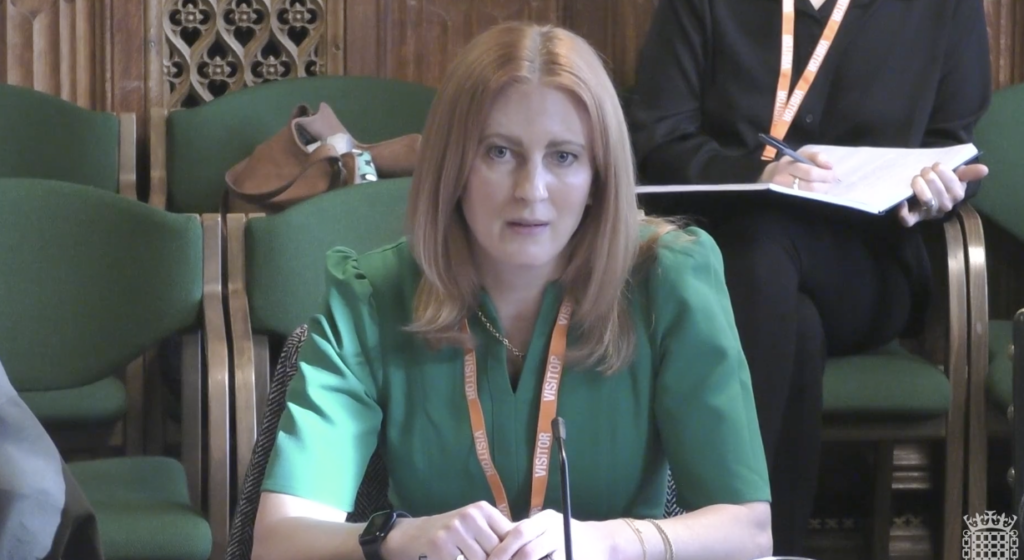The government will be complicit in a damaging future disease outbreak, if it does not address the gaping holes in our border controls, NPA chief executive Lizzie Wilson told MPs today.
Mrs Wilson appeared in front of the Environment, Food and Rural Affairs (EFRA) Committee this morning, as part of EFRA’s inquiry into the government’s preparedness for animal disease outbreaks.
Following a hard-hitting hearing in February featuring Dover Port Health Authority’s Lucy Manzano, she reiterated the industry’s concerns that funding to allow DPHA to continue its vital work in seizing illegal meat imports will cease in April, unless Defra rapidly agrees to a new funding settlement.
She revealed that the 200-tonnes threshold of illegal meat seized at the port has now been breached, with volumes increasing markedly over the first two months of the year. She also highlighted the current flaws in the Border Target Operating Model (BTOM) for commercial import checks.
Illegal imports
“We know that 90% of illegally imported products of animal origin are coming in via Dover Port and we know it’s coming in via the tourist routes, via illegally imported pigmeat in vans and coaches, etc.
“But we also know that it’s coming in via the commercial lanes because the BTOM just simply isn’t fit for purpose.
“We believe that more resource should be channelled to Dover. We still haven’t got any sort of funding agreement in place and we have literally got weeks before they will have to stop all of those inspections and checks.
“We also know that down the west coast of the country, there are no controls and no checks or monitoring whatsoever, so it’s essentially an open door for product to flow into the country,” she said, adding that the current personal import policy was confusing for tourists and very difficult to implement and enforce.
FMD concerns
“We have safeguarding measures in place for FMD at the moment, but they are entirely pointless if there isn’t the resource dedicated to implement and enforce them. Otherwise, it’s simply lip-service and we know that, from January 10, when FMD was announced in Germany, the digital auto clearance system was still operational for products coming from Germany until at least the January 18 and it’s still active now.
“There’s no mechanism to identify those lorries that have self-declared themselves as low risk and, therefore, have auto-cleared, so they don’t have to be inspected.”
A Defra spokesperson said: “The government will do whatever it takes to protect our nation’s farmers from the risk posed by foot and mouth disease. That is why restrictions were immediately brought in on animal products from Germany to prevent an outbreak.
“We ensured that auto-clearance facilities were superseded by robust biosecurity controls which were implemented at pace following confirmation of the outbreak.”
Complicit
Mrs Wilson said the government’s approach to border controls was ‘just isn’t good enough’ and called for more engagement from Defra with the different port health authorities and local authorities who are desperately trying to stop this product coming into the country.
“If we do end up with another notifiable disease, ASF is predicted to cost us between £10m and £100m and FMD potentially £14.7 billion in today’s money, and if that happens, government will be complicit, if they’ve not actually stopped the meat that they are entirely aware of is coming into this country.”
She said African swine fever was the pig sector’s biggest concern. She pointed out that ASF is currently ‘very prevalent’ across Europe and has been making its way steadily westward for a number of years and that the Animal and Plant Health Agency (APHA) currently designates the risk of the human-mediated spread of ASF as ‘high’.
“So, the fact that we’re an island surrounded by sea doesn’t make us any less at risk from such a notifiable disease,” she said.
She said the pig sector could be ‘irrevocably damaged’ from an ASF or FMD outbreak, which would result in the loss of export markets, worth about £600 million per annum, and shut down parts of the country, alongside potential widespread culling of infected pig herds.
Defra comment
On DPHA funding, Defra told Pig World it had already put a funding proposal to DPHA and that it ‘remained committed to agreeing an appropriate funding model for 2025/26 with DPHA to help tackle illegal imports’.
Defra said it was taking a ‘pragmatic approach’ to phasing in EU import controls, which was ‘carefully calibrated to balance an expectation that businesses will do their best to comply whilst protecting biosecurity and minimising disruption to the flow of goods’.
It insisted TODCOF is ‘a contingency measure that the public would expect a government digital service to have’, and is designed to support PHAs in their management of imports.




